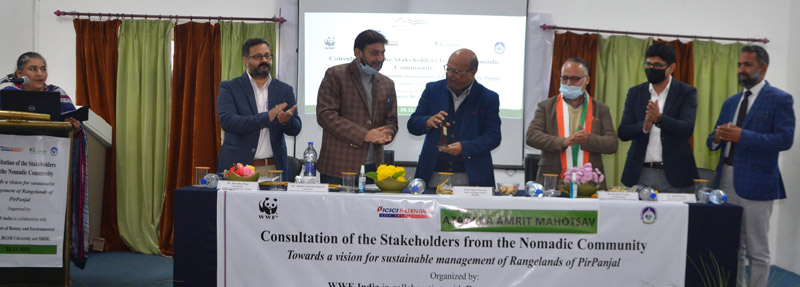
Excelsior Correspondent
RAJOURI, Nov 25: To commemorate the Azadi Ka Amrit Mahotsav, a public outreach programme for tribal communities of Pir Panjal Region was organized by Department of Botany & Environmental Sciences, BGSBU, in collaboration with WWF, India, Field Office Rajouri & School of Rural Development and Environment.
The motive of the programme was to sensitise the tribal communities about the conservation and sustainable management of alpine pastures to cater the needs of the nomadic communities.
In the afternoon session, Dr Shahid Iqbal Choudhary, Secretary, Tribal Affairs, J&K Government addressed the participants and spoke about the Government schemes and policies about conservation, management and sustainable use of biodiversity by nomads and tribes of Pir Panjal region.
He assured of his department’s full cooperation and support to BGSBU and the collaborators for implementation of those schemes at ground level so as to address the issues of tribal communities and allay their fears.
Earlier, Professor Akbar Masood, Vice Chancellor, BGSBU emphasized that such programmes go a long way in sustainable use of biodiversity in harmony with humans.
Dr Shaikh Ghulam Rasool, Chairman, School of Rural Development and Environment, highlighted the bylaws which originated out of consistent discussion and interaction of NGOs with tribal communities for the proper management of pastures.
Advocate Ayaz Ahmed Zaki, a renowned member of tribal community, highlighted how tribal communities used to coexist with nature in harmony in the past.
Professor Iqbal Parvez, Dean Academic Affairs, suggested the organisers to educate and learn from the mutual interaction of the tribal and the scientific communities so that the pasturelands are properly managed and their resources are sustainably used.
Dr Susheel Verma, Associate Dean, School of Biosciences and Biotechnology impressed upon the participants to follow the bylaws as suggested by them to WWF & SRDC for their existence in such areas of the Pir Panjal.
Dr Shreekar Pant, Coordinator, Centre for Biodiversity Studies, appealed to all the stakeholders to contribute towards sustainable utilization of the bioresources in Pir Panjal.
Rohit Rattan, Associate Coordinator, Incharge Western Himalayan Programme, WWF, India, Field Office Rajouri, threw light on the background of the initiatives and continuous interactions with communities to sustainably manage and conserve Pir Panjal range lands.
Dr Mamta Bhat, Assistant Professor, conducted proceedings of the programme.

